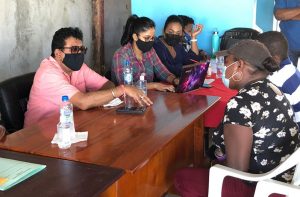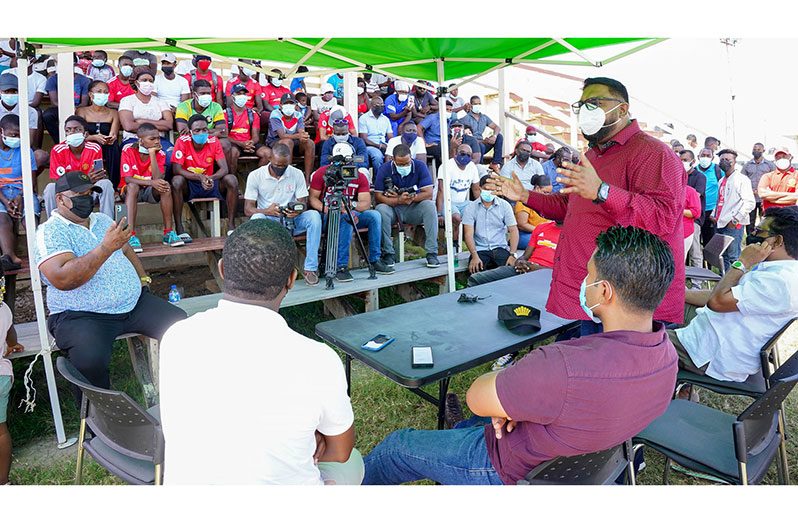THE Attorney-General and Minister of Legal Affairs, Anil Nandlall, S.C., has rejected claims by sections of society, recently aired in the press, that the government has not been consulting with the wider society.
Nandlall debunked the allegations while addressing members of the press at his outreach on Saturday at Annandale, East Coast Demerara, where he meets with hundreds of citizens on a weekly basis to address their legal concerns.

“When these things are in the public domain and you don’t respond to them and you don’t reject them and you don’t establish their falsehood, they are left on the public record and they become the truth,” Nandlall said.
“So, I want to reject out of hand, this baseless allegation that the Irfaan Ali administration is not consulting. Every single day there is some form of consultation taking place in our government,” the Attorney-General said.
The Guyana Humans Rights Association in a recent press release titled “the right to inclusive decision-making” contended that “the business community continues to be the default sector for political consultation. No other sector – whether trade union, professional, faith-based or voluntary – enjoy any such privileged access.”
Further, the former Attorney-General, Basil Williams, S.C., wrote a letter to the press alleging that the People’s Progressive Party/Civic (PPP/C) government has failed to consult with relevant stakeholders before the passage of a suite of legislation in the National Assembly.
In dismissing the contentions, Nandlall highlighted a number of consultations the government has engaged in since its assumption to office, especially under its ‘taking government to the people’ style of governance.
These include Nandlall’s weekly outreach; an inter-agency consultation hosted by the Ministry of Housing and Water on the Mandela Avenue to Eccles road; a visit to Corentyne, Berbice to address concerns; President Ali leading a high-level team of ministers to consult with stakeholders in Region Three on the four-lane highway from the new Demerara Harbour Bridge to Parika and the President’s recent visit to communities on the East Coast of Demerara to form the “Corridor of Unity” initiative, among others.
President Ali also led the first stakeholder consultation on the draft Local Content Policy at the Arthur Chung Conference Centre on February 15, 2021, which saw stakeholders from every aspect of society in attendance.
In terms of the National Assembly, Nandlall noted that in the space of six months, the government has referred two bills – the Narcotic Drugs and Psychotropic Substances (Control) (Amendment) Bill and the Hire Purchase Bill, to a Select Committee.
“Why do you think we are sending it to the Select Committee? So that the government will sit with the opposition and civil society and stakeholders and go through the bill clause by clause and hear from them. We did not have to do so,” Nandlall explained.
The Attorney-General referenced the Law Reform Commission Act 2016, enacted by the former A Partnership for National Unity + Alliance for Change (APNU+AFC) administration, which is responsible for the constitution of the Law Reform Commission. He said there was no consultations held for this.
Initially, the Act had mandated that the President, after consulting with the Minister of Legal Affairs, shall appoint the Members of the Commission. In order for someone to be appointed a member of the Commission, the person must possess legal and judicial qualifications.
Amendments to the Act were passed in the National Assembly on February 12, 2021, by the PPP/C government to allow for a diversity of qualifications on the commission.
“Look at the Law Reform Bill, the APNU passed an entire Act, it did not have any component for consultation, the Minister and the President appointed the entire Commission,” Nandlall said.
“We took that voluntary to the Parliament and we break that up to allow for the Minister to consult with the civil society, the Private Sector Commission, the Labour Movement, Rights Commissions, religious organisations. And even on the floor, I amended it to include a suggestion coming from the small party, Mr. Shuman to allow for the Toshaos to be consulted,” he added.
Nandlall maintained that the government is firm on its position that consultations with wider society are done on a regular basis. “I challenge anyone to point to any government at any point in time in Guyana that has been more consultative than the Irfaan Ali administration,” Nandlall asserted.




.png)









